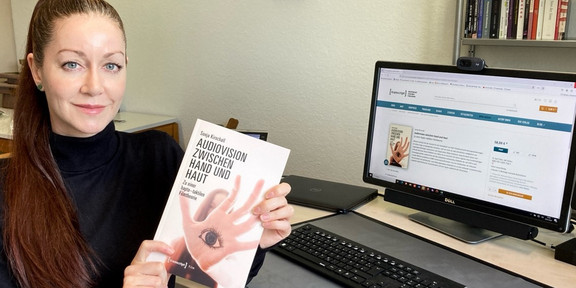Sonja Kirschall's PhD thesis published open access, funded by Open Library Community

The background to her preoccupation with the way in which the touch-related qualities of audiovisual media products have been understood and theorized to date was the observation that Laura U. Marks' theory of haptic visuality (The Skin of the Film. Intercultural Cinema, Embodiment, and the Senses. Durham/London: Duke UP), which has dominated the field for more than 20 years, reaches the limits of its descriptive capacity when it is used to examine the audiovisually teletactile aesthetics of the growing ASMR community, which are increasingly penetrating popular culture, advertising and film production. Moreover, the concept of haptic visuality is already based on a dichotomy of strongly physically experienced, haptic images on the one hand, and incorporeally distanced, optical images, on the other hand, which, on closer inspection, does not appear optimal for rigorous lived-body-phenomenological analyses and does not offer sufficient connectivity to more recent relevant cognitive science and (queer-)phenomenological approaches.
Sonja Kirschall breaks down the premises, implications, discursive effects and disadvantages of this hitherto surprisingly rarely criticized model of thought along various discourse-historical and aesthetic-analytical examinations. She shows that hitherto divided schools of thought on the haptic can be combined and drafts a systemic model of the tactile sensuality of the audiovisual, which sees image-sound-complexes as layers of different offers of attention and orientation, all of which take the sense of touch into service, but each of which makes different facets and their interactions productive for the film-aesthetic mediation and narratability of complex power effects. She thus arrives at an inventory of possible modes of cinematic tactility and the formation of a specific vocabulary as a tool for her method of hapto−tactile film analysis, that she demonstrates in a concluding analysis of the film biography Le Scaphandre et le Papillon (The Diving Bell and the Butterfly, FR/USA 2007, Julian Schnabel).
The dissertation, with which Sonja Kirschall was awarded a PhD summa cum laude in media studies at the Ruhr University Bochum, was published fully funded per Gold Open Access as part of transcript's collection “Open Library Media Studies 2024”, having been selected and awarded for this by the Editorial Board of the Open Library Community Media Studies.
Sonja Kirschall is a research associate in the research area Labour Policy and Health at the Social Research Centre Dortmund and is currenty working in the project "DepriBuddy – Design-Thinking-basierte Modellierung medialisierter Nähe und App-Entwicklung für ein Selbsthilfenetzwerk“ funded by the Federal Ministry of Education and Research (BMBF).
Further information:
Audiovision zwischen Hand und Haut on the publisher's website
Audiovision zwischen Hand und Haut on the publisher's open access site




![[Translate to English:] [Translate to English:]](/storages/zentraler_bilderpool/_processed_/a/f/csm_Kontakt_b86e8d8ecc.png)
